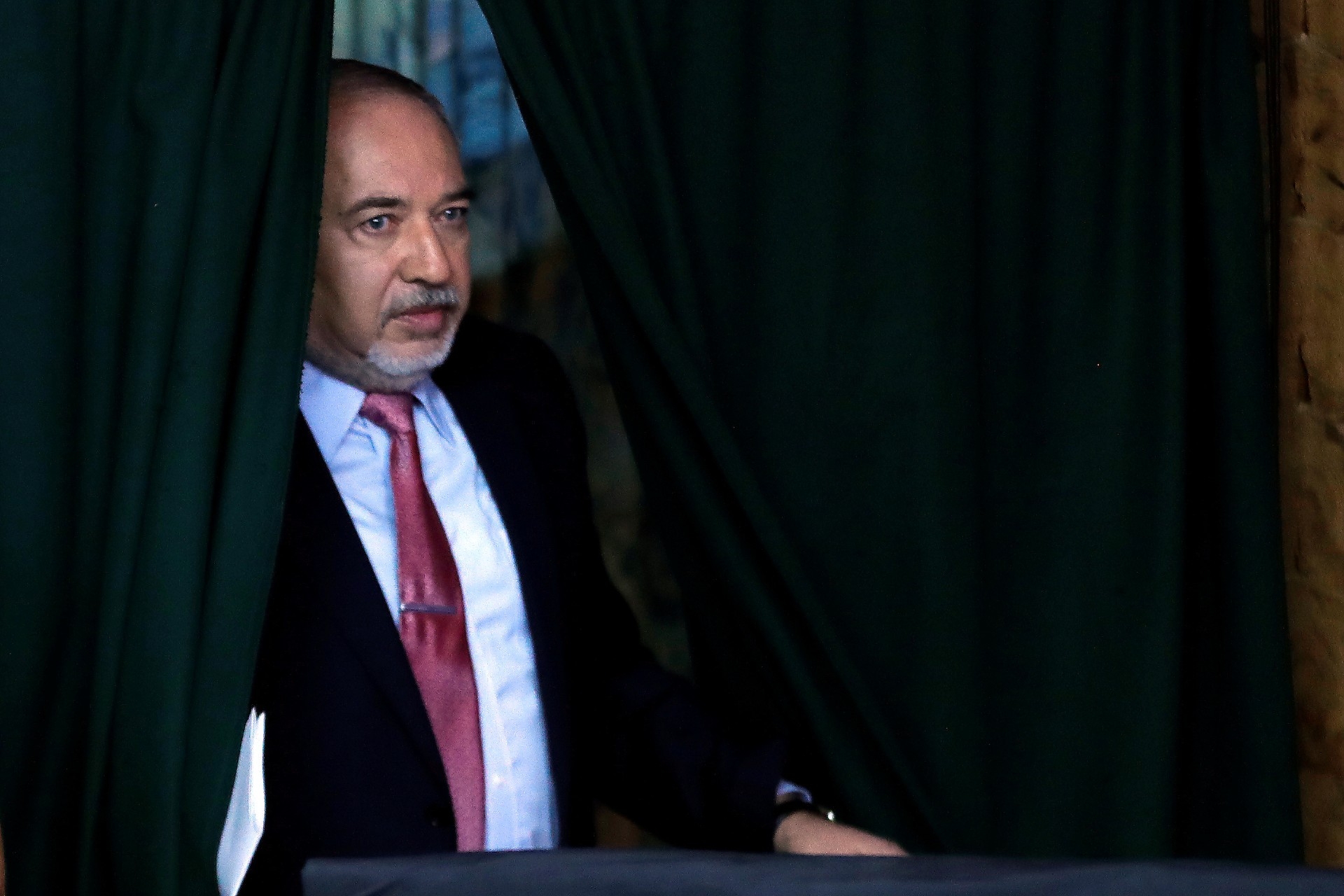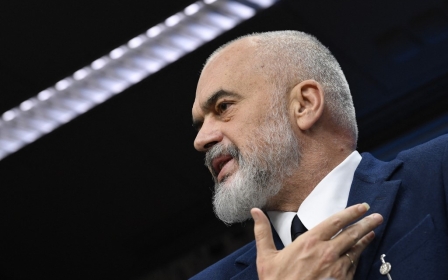Israel elections: Humdrum campaign lit up by murder-plot claims, battle for Russian votes

A few days ago, a man unknown to most Israelis alleged on social media that more than 20 years ago Avigdor Lieberman, currently the finance minister, offered him $100,000 to murder a police chief.
Yossi Kamisa, himself a former police officer, was then an activist in Lieberman's Yisrael Beiteinu party. Some claim they were close.
Allegations of corruption, money laundering and fraud have previously plagued Lieberman, stalking him at the time of this alleged event up until 2013, when he was acquitted.
Kamisa's bombshell post came soon after Lieberman wrapped up a victorious news conference announcing the end of a teachers' strike that endangered his campaign ahead of elections on 1 November.
The criminal aspect of those allegations will be looked into by Attorney-General Gali Baharv-Miara. The political dimension of this horror story, less than 60 days before Israelis vote, is part of a much broader phenomenon: a tug of war between Benjamin Netanyahu and Lieberman over the "Russian" vote.
New MEE newsletter: Jerusalem Dispatch
Sign up to get the latest insights and analysis on Israel-Palestine, alongside Turkey Unpacked and other MEE newsletters
No wonder Lieberman's first reaction to the allegations, even before he filed a criminal complaint against Kamisa, was a Facebook post entitled "Netanyahu is in panic", not only denying all allegations but also mainly insinuating that the former prime minister is behind the affair. He posted in Hebrew, for all Israeli readers.
A few days later, Netanyahu reciprocated with a post entitled "Lieberman is in panic". His post was in Russian only. That was a carefully premediated choice of language, addressed at Russian-speaking recipients - Lieberman's voter base.
The scandal refuses to fade away, with a legal probe pending. Meanwhile, Lieberman has referred to Netanyahu as "scum of the earth with no red lines"; in return, Likud, of which Netanyahu is chairman, issued a statement hoping "Lieberman will not offer someone $100,000 to kill Netanyahu".
The Russian-speaking cohort of Israelis who migrated from the former Soviet Union, believed to number around 900,000, is no less confused than the general populace, with one small difference: for them, it is more personal. Some even interpret the furore as an assault on their "Russian" party, Yisrael Beiteinu, or on the community in general.
Most Russian-speaking Israelis at this point don't really care, especially since the validity of these allegations is still obscure and Lieberman has no proof of Netanyahu's involvement.
New parties
One thing that can be said for this drama is that it has livened up a so far lethargic election campaign. Yet it is less visible and less noticeable than other issues, mainly because it is playing out in Russian and is focused on a specific community.
In other words, it is a full-scale war between Netanyahu and Lieberman. After 44 years in Israel, having served as defence and finance minister, Lieberman is still perceived by many as a "new immigrant", and his party, which describes itself as national, the preserve of "Russians" only.
That image is certainly something Lieberman cultivates prior to all elections, marketing himself as the savior of the "Russian" community, the only one who cares about this community that stills looks for representation.
Yet where once the 12 potential parliamentary seats that could be delivered by the "Russian" community appeared locked in by Lieberman, now they are perceived as far more fluid and worth chasing. Netanyahu is certainly after the votes Lieberman sees as his own legacy.
There is actually nothing new in this struggle. In all four preceding election campaigns since 2019, Netanyahu and his Likud party were behind the formation of "Russian" parties that presented themselves as an alternative to Yisrael Beiteinu. Those small, insignificant creations were never meant to win. Their only intention was to cause the biggest possible damage to Lieberman's party.
All attempts failed miserably, winning only between 300 to 4,816 votes each, a far cry from the 140,000 necessary for a seat in Israel's parliament, the Knesset. Still, Likud does it again.
Behind the scenes of the campaign, there is an attempt to engage leading figures in the Russian-speaking community and form a rival Russian party just to cause significant damage to Lieberman. The new party is not yet in sight, but Lieberman is up in arms.
Days before the new allegations turned into a major scandal, Lieberman was obsessed with Likud's attempt to form another party. He kept referring to it in all interviews, and wrote about it extensively on social media.
"There is one phenomenon common to all election campaigns," he wrote on Facebook. "Somehow, close to elections, a new party emerges, designed for one purpose only - to 'take a bite' out the cohort of the Russian-speaking supporters of Yisrael Beiteinu. Rumour says that the man behind it is Netanyahu."
This is how Lieberman sounds when he is really worried: cynical and seemingly amused. He is not. He is deeply concerned, and has a very good reason to be so. Netanyahu means business.
It's no longer just the well-known animosity between the two, who for a decade were close allies. Of all the figures who make up the anti-Netanyahu bloc, Lieberman's political elimination can pave Netanyahu's way back to the prime minister's office. If Lieberman fails to cross the electoral threshold, Netanyahu's victory is pretty much secured.
He cannot take out Benny Gantz, the defence minister still perceived by Likud as a potential future partner. He cannot do it to Prime Minister Yair Lapid, whose Yesh Atid party is too strong and too big.
He can, and wants, to do it to Lieberman only. In the fifth round of elections, Netanyahu is fighting for his political survival. If all is fair in love and war, the same can be said for hate and war.
Beyond Israel's borders
The race for the votes of the "Russian" community - and others too - goes beyond the borders of Israel.
Meet the veteran star of Israeli elections: Vladimir Putin, the one Netanyahu used in his previous campaign, posting huge posters of the two leaders with the tagline: "Leader of another league".
There's an assumption that the Russian invasion of Ukraine will make Putin an electoral pariah. Netanyahu begs to differ. Since the onset of the invasion, he has kept surprisingly quiet about the war. In fact, the "special relations" between Netanyahu and Putin that the Likud leader takes pride in never ended. Soon after Netanyahu was booted from office a year ago, he sent Putin a message: "I'll soon be back."
Just over a month ago, Netanyahu called a surprise news conference, just to accuse Lapid and Gantz of amateurish and incompetent handling of the crisis with Moscow over the activity of the Jewish Agency in Russia. The message was: "I'll do it better. Putin and I."
Those present sensed Netanyahu was back, shamelessly enlisting Putin into his new campaign. According to Russian political scientists, Putin, parallel to the war with Ukraine, is actively involved in reinstating his old loyal friends, like Donald Trump and Silvio Berlusconi, who is now plotting a comeback in Italy. Two of those political analysts told Middle East Eye that Netanyahu falls into the same category.
'Yevgeny Prigozhin controls a system that allows him to infiltrate the internal politics of different countries, including Israel'
- David Aidelman, analyst
In the meantime, Putin might not be enough. An army of internet trolls has been mobilised to spread the message of Netanyahu and his most ardent supporters, nicknamed "Bibists". Lapid's Yesh Atid party filed a criminal complaint and asked the attorney general to investigate the phenomenon it defines as a "poison machine".
It's a social media trend that has parallels in Russia, where internet trolls and disinformation are pumped out to target Moscow's opponents and spread support of the Ukraine war. British intelligence has alleged Yevgeny Prigozhin, a close ally of Putin who heads the notorious Wagner Group military contractor, is behind the activity.
Sources who closely follow the involvement of internet trolls in the current Israeli election campaign told MEE that Prigozhin might be linked to the accounts working in favour of Likud and Netanyahu.
David Aidelman, an expert on media and politics in post-Soviet republics, told MEE: "Prigozhin is the most dangerous entity, more dangerous than Putin himself. He controls a system that allows him to infiltrate the internal politics of different countries, including Israel."
Confused? Rightfully so. It is confusing and ugly, unfortunately not the only ugly aspect of 2022's elections.
Middle East Eye delivers independent and unrivalled coverage and analysis of the Middle East, North Africa and beyond. To learn more about republishing this content and the associated fees, please fill out this form. More about MEE can be found here.






